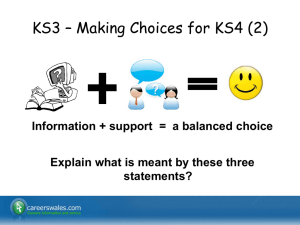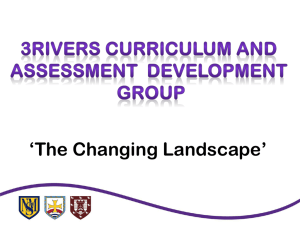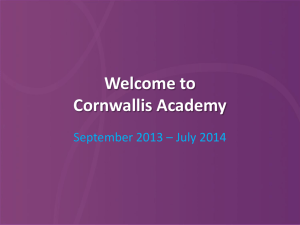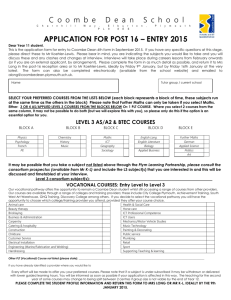Report on Functional skills maths and english Event
advertisement
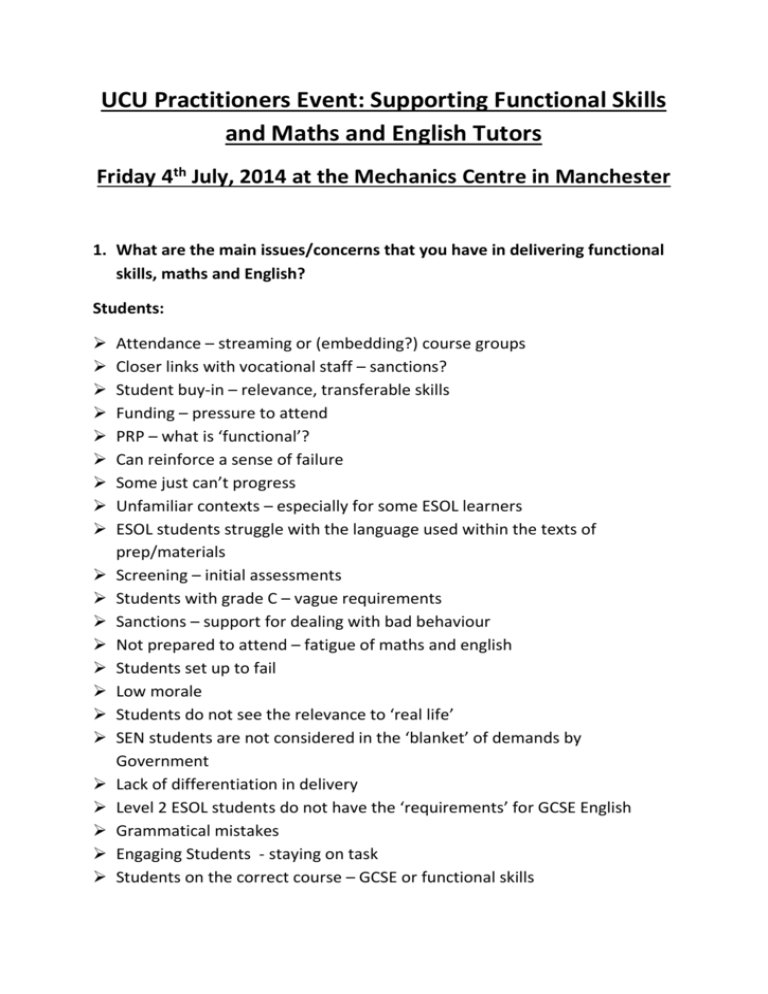
UCU Practitioners Event: Supporting Functional Skills and Maths and English Tutors Friday 4th July, 2014 at the Mechanics Centre in Manchester 1. What are the main issues/concerns that you have in delivering functional skills, maths and English? Students: Attendance – streaming or (embedding?) course groups Closer links with vocational staff – sanctions? Student buy-in – relevance, transferable skills Funding – pressure to attend PRP – what is ‘functional’? Can reinforce a sense of failure Some just can’t progress Unfamiliar contexts – especially for some ESOL learners ESOL students struggle with the language used within the texts of prep/materials Screening – initial assessments Students with grade C – vague requirements Sanctions – support for dealing with bad behaviour Not prepared to attend – fatigue of maths and english Students set up to fail Low morale Students do not see the relevance to ‘real life’ SEN students are not considered in the ‘blanket’ of demands by Government Lack of differentiation in delivery Level 2 ESOL students do not have the ‘requirements’ for GCSE English Grammatical mistakes Engaging Students - staying on task Students on the correct course – GCSE or functional skills Staff Who is responsible? Vocational/key skills Lack of discipline if students do not attend Low morale Vocational tutors are expected to teach maths and English Not much support for staff for exam boards Teaching different vocational areas mixed together with delivering various levels College (OFSTED) inspections are dependent on the English/maths department Frustration of students not progressing Some lack qualifications, experience, competence etc. Some college have attitude that ‘anyone can teach it’ Time constraints for staff to get together 2. Are there any areas of good practice that you can identify in the place/s that you work in delivering functional skills, maths and English? Flexible qualification lends itself to being vocationally embedded Created good resources – e.g. workbooks Positive experience for adults Students can re-take Good preparation for life Clear communication with FS staff involving pre-planning (when given the time) Good screening of students (esol/functional GCSE working together) Integrate maths/English into subject and vocational specialisms SLDD units (E2/E3) use skills that would be beneficial to other levels of teaching/learning (need to share these practices) Use of practical activities to learn the skills in maths /English (away from classroom) Using the environment and community as a resource (park project) All colleges invited to a ‘sharing good practice’ consortium Peer observation Links with vocational areas Designated base room Variety of activities – ‘starter of the day’, Nrich, kangaroo maths Routine – quick-quiz, plenary Shorter lessons Time allocation – same as GCSE Maximum class size 3. What could UCU do more of, to help you with your role? Lobby exam boards for more flexibility in the choice of questions for exams to make it more relevant to the learners Consideration of the language level in maths (especially for ESOL learners) Negotiate with employers about expectations on staff teaching across all functional skills subjects and teaching GCSE Negotiate for a ‘subject specialist status’ Negotiate on pay increase – pay issue for GCSE not on a par with schools Negotiate for transition courses that must be provided for GCSE before teachers should be asked to deliver Campaign to maintain functional skills rather than GCSE for vocational programmes Negotiate with employers to provide training and policies on ESOL awareness and ILP awareness, and how to work closer with personal/progress tutors for all staff Lobby for ‘building blocks’ of maintaining skills (funded) rather than pushing people up to the next level too soon Highlight areas that can benefit from the practical sharing of skills/units particularly SLDD units within social/emotional skills Inform or provide training on different levels of learning from both males and females. I.e. men(dyslexic) female (dyscalculia) Raise awareness of effective feedback that is specific i.e. connectives/sentence structure Raise awareness of the need for maths and English external to education Campaign against graded lesson observations linked to pay Janet Newsham UCU Learning Development Organiser jnewsham@ucu.org.uk


